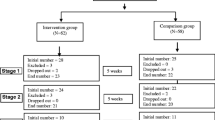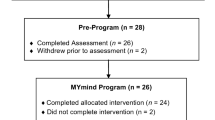Abstract
The present study examines the hypotheses that children of divorce who participate in a 12-week mindfulness-training program (Mindfulness-Based Cognitive Therapy for Children, MBCT-C) would show greater reductions in depression, anxiety, and anger symptoms and would demonstrate enhanced emotional resiliency. This study utilized a semi-experimental prospective design with pre-, post-, and follow-up measures and a no-treatment control group. A sample of 83 children (ages 10 to 13) and living with a divorced parent were collected from six public schools in Tehran, Iran. The total sample, consisting of 33 boys and 50 girls, was randomly assigned to two groups: an experimental group (n = 42, 16 boys and 26 girls) and a no-treatment control group (n = 41, 17 boys and 24 girls). The experimental group received twelve 90-min sessions of MBCT-C, which was translated into Persian with minor cultural adaptations. All participants completed measures including the State-Trait Anxiety Inventory for Children (STAIC), State-Trait Anger Expression Inventory-2 (STAXI-2), Children’s Depression Inventory (CDI), and Child and Adolescent Mindfulness Measure (CAMM) at pre-test, post-test, and at 2-month follow-up. At the end of intervention, the experimental group showed significantly fewer symptoms of depression, trait anxiety, state anxiety, trait anger, and state anger in comparison with the control group. The intervention group also demonstrated an increase in emotional resiliency and significant enhancements in acceptance and mindfulness. The results provide support that MBCT-C can be an effective intervention to improve the emotional resiliency of children of divorce.






Similar content being viewed by others
References
Allison, P. D., & Furstenberg, F. F. (1989). How marital dissolution affects children: variations by age and sex. Developmental Psychology, 25(4), 540–549.
Amato, P. R. (2001). Children of divorce in the 1990ʼs: an update of the Amato and Keith (1991) meta-analysis. Journal of Family Psychology, 15(3), 355–370. https://doi.org/10.1037/0893-3200.15.3.355.
Amato, P. R., & Keith, B. (1991). Parental divorce and the well-being of children: a meta-analysis. Psychological Bulletin, 110(1), 26–46.
Baer, R. A. (2006). Mindfulness-based treatment approaches: clinician’s guide to evidence base and applications. New York, NY: Academic Press.
Barrett, P. M., Lowry-Webster, H., & Turner, C. (2006). FRIENDS program for children: group leaders manual. Brisbane, Australia: Australian Academic Press.
Black, D. S., Sussman, S., Johnson, C. A., & Milam, J. (2012). Testing the indirect effect of trait mindfulness on adolescent cigarette smoking through negative affect and perceived stress mediators. Journal of Substance Use, 17(5–6), 417–429. https://doi.org/10.3109/14659891.2011.587092.
Brewer, M. M. (2010). The effects of child gender and child age at the time of parental divorce on the development of adult depression (Doctoral dissertation). Retrieved from ProQuest Dissertations and Theses. (Order No. 3404338).
Dehghani, M., & Esmailian, N. (2017). Personality characteristics, early maladaptive schema and family function in couples initiating for divorce versus non-initiating ones. Journal of Family Research, 2(4), 575–592.
Esmailian, N., & Dehghani, M. (2017). Re-examination of psychometric properties and factor structure of five child and adolescent mindfulness measure (CAMM). Manuscript submitted for publication.
Esmailian, N., Tahmassian, K., Dehghani, M., & Mootabi, F. (2013). Effectiveness of mindfulness-based cognitive therapy on depression symptoms in children with divorced parents. Journal of Clinical Psychology, 5(3), 47–57.
Esmailian, N., Tahmassian, K., Dehghani, M., & Mootabi, F. (2015). The effectiveness of mindfulness-based cognitive therapy on emotion regulation, mindful attention and acceptance in children with divorced parents. Journal of Achievements in Clinical Psychology, 1(2), 45–66.
Greco, L. A., Smith, G., & Baer, R. A. (2011). Assessing mindfulness in children and adolescents: development and validation of the child and adolescent mindfulness measure (CAMM). Psychological Assessment, 23, 606–614. https://doi.org/10.1037/a0022819.
Hett, G. G., & Rose, C. D. (1991). Counseling children of divorce: a divorce lifeline program. Canadian Journal of Counseling, 25(1), 38–49.
Jacobson, N. S., & Truax, P. (1991). Clinical significance: a statistical approach to defining meaningful change in psychotherapy research. Journal of Consulting and Clinical Psychology, 59, 12–19.
Kelly, J. B. (2000). Children’s adjustment in conflicted marriage and divorce: a decade review of research. Journal of the American Academy of Child and Adolescent Psychiatry, 39(8), 963–973. https://doi.org/10.1097/00004583-200008000-00007.
Kelly, W. F., Checkley, S. A., Bender, D. A., & Mashiter, K. (1983). Cushing’s syndrome and depression: a prospective study of 26 patients. British Journal of Psychiatry, 142(1), 16–19. https://doi.org/10.1192/bjp.142.1.16.
Kirisci, L., Clark, D. B., & Moss, H. B. (1997). Reliability and validity of the state-trait anxiety inventory for children in adolescent substance abusers. Journal of Child & Adolescent Substance Abuse, 5(3), 57–70. https://doi.org/10.1300/J029v05n0304.
Kovacs, M. (1992). The children depression inventory (CDI). New York, NY: Multi-Health Systems, Inc..
MacKinnon, D. P., Warsi, G., & Dwyer, J. H. (1995). A simulation study of mediated effect measures. Multivariate Behavioral Research, 30, 41–62.
Maedgen, J. W., & Carlson, C. L. (2000). Social functioning and emotional regulation in the attention deficit hyperactivity disorder subtypes. Journal of Clinical Child Psychology, 29(1), 102–111. https://doi.org/10.1207/S15374424jccp2901-4.
Mendelson, T., Greenberg, M., Dariotis, J., Gould, L., Rhoades, B., & Leaf, P. (2010). Feasibility and preliminary outcomes of a school-based mindfulness intervention for urban youth. Journal of Abnormal Child Psychology, 38(7), 985–994. https://doi.org/10.1007/s10802-010-9418-x.
National Center for Health Statistics (NCHS) (2015). National vital statistics system: marriages and divorces. Retrieved from http://www.cdc.gov/nchs/mardiv.htm.
National Organization for Civil Registration (NOCR) (2016). Divorce rates in Iran. Retrieved from https://www.sabteahval.ir/default.aspx?tabid=4760
Navidi, A. (2005). Psychometric properties of state–trait anger expression inventory. Tehran, Iran: Sina-ravantajhiz.
Roseby, V., & Johnston, J. R. (1998). Children of Armageddon: common developmental threats in high-conflict divorcing families. Child and Adolescent Psychiatric Clinics of North America, 7(2), 295–309.
Schonert-Reichl, K. A., & Lawlor, M. S. (2010). The effects of a mindfulness-based education program on pre- and early adolescents’ well-being and social and emotional competence. Mindfulness, 1(3), 137–151. https://doi.org/10.1007/s12671-010-0011-8.
Segal, Z. V., Williams, J. M. G., & Teasdale, J. D. (2002). Mindfulness-based cognitive therapy for depression: a new approach to preventing relapse. New York, NY: Guilford Press.
Semple, R. J., & Lee, J. (2011). Mindfulness-based cognitive therapy for anxious children. Oakland, CA: New Harbinger Publications.
Semple, R. J., Reid, E. F. G., & Miller, L. (2005). Treating anxiety with mindfulness: an open trial of mindfulness training for anxious children. Journal of Cognitive Psychotherapy, 19(4), 379–392. https://doi.org/10.1891/jcop.2005.19.4.379.
Semple, R. J., Lee, J., & Miller, L. (2006). Mindfulness-based cognitive therapy for children. In R. A. Baer (Ed.), Mindfulness-based treatment approaches: clinician’s guide to evidence base and applications (pp. 143–166). Burlington, MA: Academic Press.
Semple, R. J., Lee, J., Rosa, D., & Miller, L. (2010). A randomized trial of mindfulness based cognitive therapy for children: promoting mindful attention to enhance social emotional resiliency in children. Journal of Child and Family Studies, 19(2), 218–229. https://doi.org/10.1007/s10826-009-9301-y.
Spielberger, C. D. (1972). Anxiety: current trends in theory and research (Vol. 1). New York, NY: Academic Press.
Spielberger, C. D. (1999). State-trait anger expression inventory-2TM: professional manual. Odessa, FL: Psychological Assessment Resource, Inc..
Spielberger, C. D., Edwards, C. D., Lushene, R. E., Montuori, J., & Platzek, D. (1983). State-trait anxiety inventory for children: professional manual. Redwood City, CA: Mind Garden, Inc..
Tabachnick, B. G., & Fidell, L. S. (2007). Using multivariate statistics. New York, NY: Pearson Education, Inc..
Tahmassian, K. (2004). The Iranian form of children’s self-efficacy questionnaire (SEQ-C). Tehran, Iran: Family Research Institute, Shahid Beheshti University.
Tan, L., & Martin, G. (2013). Taming the adolescent mind: preliminary report of a mindfulness-based psychological intervention for adolescents with clinical heterogeneous mental health diagnoses. Clinical Child Psychology and Psychiatry, 18(2), 300–312. https://doi.org/10.1177/1359104512455182.
Van de Weijer-Bergsma, E., Langenberg, G., Brandsma, R., Oort, F. J., & Bögels, S. M. (2014). The effectiveness of a school-based mindfulness training as a program to prevent stress in elementary school children. Mindfulness, 5, 238–248. https://doi.org/10.1007/s12671-012-0171-9.
Wallerstein, J. S., & Lewis, J. (1998). The long term impact of divorce on children: a first report from a 25-year study. Family and Conciliation Courts Review, 36(3), 368–383.
Walsh, F. (2006). Strengthening family resilience. New York, NY: Guilford Press.
Weiss, R. (1976). The emotional impact of marital separation. Journal of social Issue, 39, 135–145.
Zamaniasl, Z. (2006). Early adaptation of state-trait anxiety inventory in students of Tehran. (Unpublished doctoral dissertation). Tarbiat Moallem University, Tehran, Iran.
Acknowledgements
We would like to thank Dr. Sandra Stith for her helpful comments on a previous draft of this paper.
Author information
Authors and Affiliations
Contributions
NE designed and developed the proposal, analyzed the data, and wrote the paper. MD was involved in the design, proposal development, and writing of the paper. ZD was involved in the data collection. JL contributed to the writing and editing of the final manuscript.
Corresponding author
Ethics declarations
The study was approved by the Family Research Institute Research Committee and the Ethical Review Board at Shahid Beheshti University. Informed consent was obtained from all individual participants included in the study.
Rights and permissions
About this article
Cite this article
Esmaeilian, N., Dehghani, M., Dehghani, Z. et al. Mindfulness-Based Cognitive Therapy Enhances Emotional Resiliency in Children with Divorced Parents. Mindfulness 9, 1052–1062 (2018). https://doi.org/10.1007/s12671-017-0840-9
Published:
Issue Date:
DOI: https://doi.org/10.1007/s12671-017-0840-9




